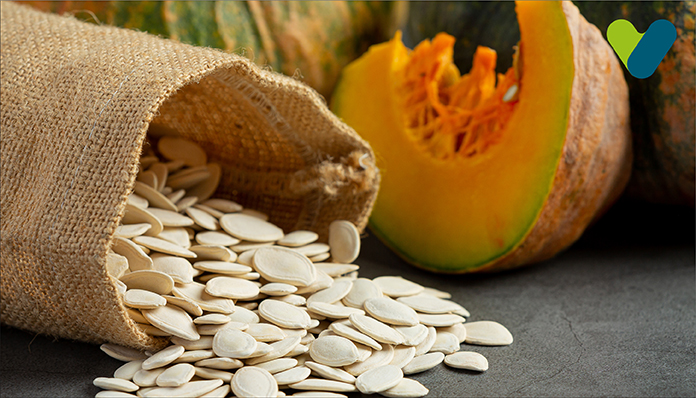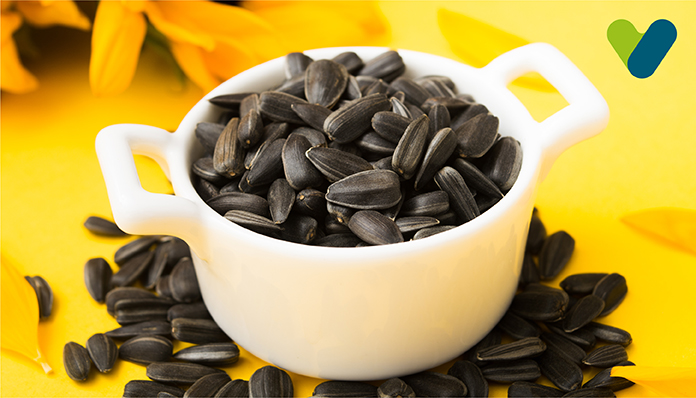Managing a child who is ill can be a nightmare! I guess all parents would agree with this. Your child may fall sick often, right from suffering from a common cold to fever, sore throat, and diarrhoea. Children frequently fall sick as their immune systems are not fully mature until they are around seven or eight, which means they are still prone to infections when they start preschool or school. Nutrition is vital to keep children hydrated and fuelled, and certain foods that may reduce fever, may also aid faster recovery. The ultimate objective is to get children feeling better quickly. The same is the case with our friend Seema! Seema is a working mother of a son (6 years old). Despite her busy schedule, Seema looks after her son in the best possible way. Over the past few days, she noticed her son had a fever and headache. Without wasting any time, Seema consulted a doctor who prescribed some medications to combat the fever. The doctor also explained to her what types of food to eat during fever and what she should provide to her son so that he may get a faster recovery. Fever is the body’s way of fighting unwanted infections or foreign particles. Some of the causes for fever are infections, inflammation and even seasonal changes. Due to elevated body temperatures and the process of fighting infections, a lot of energy is utilized by the body during this time. Thus, a balanced diet is recommended by doctors. Children are more susceptible to various illnesses and their immune systems are weaker than adults. Certain foods for fever may help your child feel better, recover more quickly, or stay hydrated. Here we are going to mention some food for kids to eat during fever.
1. Chicken Soup
Chicken soup is the best food for fever due to an array of reasons. This easy-to-eat food item is a richer source of vitamins, minerals, calories, and protein. Your body may need all these essential nutrients in larger quantities while you are suffering from fever. Chicken soup is also a good source of fluid and electrolytes. These two nutrients are essential if you have other side effects of fever, including diarrhea, vomiting, sweating, etc. The soup’s warmth will lessen congestion as it contains spicy and hot ingredients.The chicken in the chicken soup also possesses the amino acid cysteine. N-acetyl-cysteine works with breaking down the mucus. It is perfect for availing the anti-inflammatory and even antiviral effects.
Homemade chicken soup is also rich in collagen and nutrients that may boost the recovery process.
2. Garlic
Garlic has inscribed its name in the Indian kitchen due to its plethora of health benefits. For centuries, this spice has been used in herbal medicines. Garlic possesses antibacterial, antiviral, and antifungal properties. A study was conducted on 146 participants who consumed garlic-based supplements and it has been revealed that nearly 70% of them had fewer sick days than the placebo group.Garlic supplements will enhance your immune function and lessen the severity of colds and the flu. You can simply choose to add the garlic in the food when your children are suffering from the flu or even cold. Normally, it could not be adding flavor but they would make the food effective for fighting flu and cold.
3. Coconut Water
This is an ideal beverage to drink when your child is suffering from fever and other symptoms. This contains electrolytes that need to be refilled along with fluids when the patient is vomiting, sweating, having diarrhea, or running a fever. Moreover, coconut oil also contains natural sugar that can give a quick and easy-to-use energy source for your body. Sometimes, coconut water may produce bloating as compared to other beverages, so start it slowly.4. Banana
If you are looking for some fruits for fever, then bananas could be the best choice. Though they are bland, they contain many nutrients and fast-acting carbs. The potassium in bananas will replenish your electrolyte stores because potassium is the prime electrolyte that your body needs. Banana comes up with soluble fiber so it can reverse diarrhea by minimizing the amount of free water in your digestive system.5. Yogurt
Yogurt comes up with many beneficial probiotics that are the strains of gut bacteria and offer an array of health benefits. Probiotics are beneficial for both children and adults as they help get colds less often, promote faster recovery, and you may need fewer antibiotics. One medical study has revealed that sick children taking probiotics felt better an average of 2 days faster, and their symptoms were about 55% less severe.But if you think that dairy products are making your congestion worse, then you may take other fermented foods (like kombucha) or probiotic supplements.
6. Certain Fruits
Fruits are excellent sources of vitamins, minerals, antioxidants, and fiber. All these are beneficial for your overall health and improve your immune function. Fruits that are rich in vitamin C (An antioxidant) help your immune system function properly. Moreover, some fruits contain antioxidants like anthocyanins, which give colors (red and blue colors) to fruits like strawberries and blueberries.Due to anthocyanins, berries are an ideal choice to eat when sick. Berries come up with strong anti-inflammatory, antiviral, and immune-boosting properties.
Several medical studies have proved that fruit extracts that are high in anthocyanins may prevent common viruses and bacteria from fastening to cells. They also stimulate your body’s immune response to foreign invaders. So, add some colorful fruits to a bowl of oatmeal to make them more effective or you can prepare a cold smoothie by mixing various fruits.
7. Avocados
Avocados contain healthy monounsaturated fats, fiber, vitamins, and minerals. They are one of the greatest options that you can offer to your child when he is sick. These fruits provide calories, vitamins, and minerals that your body needs when you are unwell. They are soft and easy-to-eat food items. Avocados contain healthy fats like oleic acid that can decrease inflammation of your immune system.8. Salmon
When you are sick, your body needs more protein and salmon are the ideal protein source that will fulfill your daily protein requirements. It is soft, easy to eat, and full of high-quality protein. Salmon contains higher omega-3 fatty acids that have strong anti-inflammatory effects. Thus, this fish will make your immune system work more efficiently. Salmon is an excellent source of many vitamins and minerals including vitamin D. Vitamin D plays an imperative role in immune function.Foods to avoid when your child has a fever
- Foods high in sugar While your child may need their favourite comfort food while they are ill, sugary foods such as cakes, doughnuts, and other types of sweet treats have little, if any, beneficial nutrients. Excessive sugar may also trigger stomach inflammation and make your child's immune system work even harder.
- Caffeinated drinks In the modern day, many children do not drink coffee or tea. Children might drink fizzy sodas and many others. These contain more caffeine but it would be harmful for your health. The drinks may dehydrate your child, and above all, such beverages contain too much sugar which is not good for a fever (as explained above).
- Processed foods Processed foods such as fried foods and packaged snacks are often high in unhealthy fats, salt, and sugar, which can worsen inflammation, lead to stomach discomfort, and make it harder for your child's immune system to fight off the infection.
The Bottom Line
- Fever (High Temperature) In Kids. Nemours KidsHealth[Internet]. https://kidshealth.org/en/parents/fever.html .Accessed April. 20, 2023.
- High temperature (fever) in children. National Health Service[Internet]. https://www.nhs.uk/conditions/fever-in-children/ .Accessed April. 19, 2023.
- Fever in Children. Stanford Children's Health[Internet]. https://www.stanfordchildrens.org/en/topic/default?id=fever-in-children-90-P02512 .Accessed April. 19, 2023.
- Fever in Children. NHS inform[Internet]. https://www.nhsinform.scot/illnesses-and-conditions/infections-and-poisoning/fever-in-children/ .Accessed April. 20, 2023.




